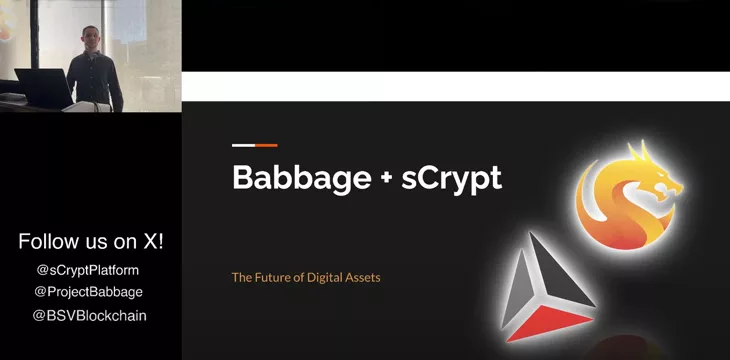|
Getting your Trinity Audio player ready...
|
Bitcoin does not use centralized “accounts” to keep track of information, and this is important. Instead, developers can build layered services that put users back at the center of everything, allowing them to choose who can access that information and when. This also needs to work across different applications. In his recent presentation at the sCrypt Hackathon 2024 event in San Francisco, Project Babbage founder Ty Everett says there’s a need to look at the “first principles” of contracts and trade.
The full afternoon session of Day One is available at this link, and you can catch the entire two-day series of sCrypt Hackathon 2024 presentations on the CoinGeek YouTube channel. The presentations showcase blockchain’s basic features before going into more technical detail about how sCrypt’s TypeScript-based environment makes it easier for developers to turn their visions into working products.
Why digital ‘smart contracts’ are so powerful
“We’re going to zoom all the way out and talk about why we’re here,” Everett said.
He begins by explaining why digitizing contracts—often called “smart contracts” for convenience—is so useful. The much older concepts of people making an agreement they understand with others they can identify are still very relevant. Computers simply add value to the process.
Digitized, blockchain-recorded contracts are useful for keeping records of everything and automating certain steps (e.g., payments). Bitcoin in 2009 made it possible to transfer a digital record from one owner to another, but without the sender retaining an exact copy—this was much more of a breakthrough than it would appear to those who haven’t considered the problem before.
Identity is fragmented on the Internet, and communication is often private. There should be a way to “own” a unified ID across platforms, allowing other people and apps to tap into that information when needed. The private key you use to sign digital records should link to that identity and others should be able to easily verify it.
“Bitcoin was the missing piece” that made these ancient economic concepts possible in the digital world, Everett said, adding that it does so without the need for trusted/centralized third parties.
“It’s going to bring down the cost of doing business digitally, it’s going to give people the power to exchange, and it’s going to put people at the center of those equations. It’s going to move across platforms without needing to update their accounts on many different systems because Bitcoin isn’t an account-based system. The users themselves transact and track their own information. Every app that uses Bitcoin is going to plug into the user at the center.”
What is Project Babbage and sCrypt’s role in all this?
Put simply, Project Babbage‘s task is to make these processes easier and user-friendly for everyone. Like sCrypt, its job is to provide the key tools and “foundational pieces … the underlying layer” that other apps can tap into in a way that’s accessible to developers. Everett’s presentation also features a Q&A and technical demonstrations of Project Babbage’s apps/services.
The layered approach to technology is important, Everett added, since tech companies and the platforms they build tend to come and go. Users need to have protocols that still work even if a particular service is superseded or goes out of business and maintain access to their data.
He describes the current Internet and digital economy as “a dystopia” of “sticky apps” and deliberately addictive platforms. Everett added that we may only have about three to five years to find ways to make it work properly.
How does Project Babbage work with sCrypt? If sCrypt is the smart contracting platform, then “Project Babbage is the pens and paper.” It puts the user back in control at the center of things by defining a standardized wallet containing identity, keys, and assets and creating the interface and mechanisms for external apps to access it all.
“And sCrypt is the best way for creating smart contracts, by far,” he said.
If you’re a developer and all this sounds interesting, check out the other Hackathon presentations or take a look at sCrypt’s body of work. If you miss out on participating in the 2024 Hackathon, sCrypt’s website is open any time as a resource for people to find out more.

 03-05-2026
03-05-2026 




